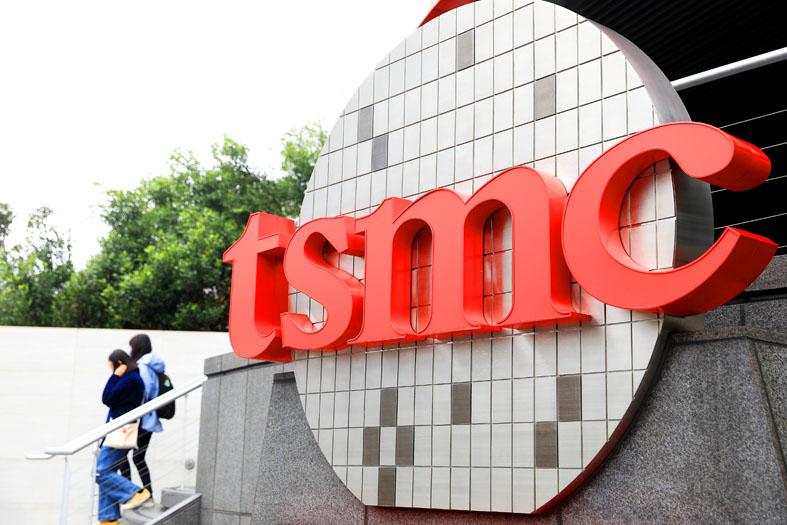Taiwan Semiconductor Manufacturing Co’s (TSMC, 台積電) revenue rose to a record in the first quarter on demand for chips used in smartphones, computers and vehicles, while a prolonged shortage helped to boost prices.
Revenue jumped 36 percent to NT$491.1 billion (US$17 billion) in the first quarter, the company said in a statement yesterday.
Analysts estimated NT$469.4 billion on average.

Photo: Cheng I-hwa, Bloomberg
Demand for mobile phones, smart televisions and other gadgets from makers such as Apple Inc and Samsung Electronics Co remains robust even as consumers in major markets in Europe and the US exit COVID-19 pandemic-era lockdowns and work-from-home arrangements.
Meanwhile, a chip shortage is yet to ease — the wait times for semiconductor delivery grew again last month due to China’s COVID-19 lockdowns and an earthquake in Japan that hit production, research by Susquehanna Financial Group said.
TSMC has kept production running in China, even as many other factories suspended operations to cope with the local pandemic policy. The chip assembler said at the end of last month that it would rearrange production priorities to deal with a shift in demand caused by COVID-19 restrictions in Shanghai and Shenzhen.
TSMC was not planning to revise down its sales and capital spending forecasts for this year, chairman Mark Liu (劉德音) said at the time.
Shares of TSMC have lost about 8 percent this year, hurt by a broader decline in global technology stocks and China’s lockdowns, which have weighed on consumer demand and affected supply chains. The stock advanced 0.2 percent yesterday ahead of the company’s report.
Separately, contract chipmaker United Microelectronics Corp (UMC, 聯電) yesterday said revenue soared 34.66 percent last quarter to a new record high of NT$63.42 billion, compared with NT$47.1 billion in the same period last year.
On a quarterly basis, revenue expanded 7.31 percent, slightly better than the chipmaker’s expectations.
UMC expected revenue to rise about 5 percent sequentially, primarily due to price hikes, citing strong chip demand from makers of vehicles, Internet-of-Things devices and display drivers.
UMC forecast that revenue growth this year would outstrip the foundry’s sector projected growth of 20 percent in a best-case scenario.
Additional reporting by Lisa Wang

Taiwan will prioritize the development of silicon photonics by taking advantage of its strength in the semiconductor industry to build another shield to protect the local economy, National Development Council (NDC) Minister Paul Liu (劉鏡清) said yesterday. Speaking at a meeting of the legislature’s Economics Committee, Liu said Taiwan already has the artificial intelligence (AI) industry as a shield, after the semiconductor industry, to safeguard the country, and is looking at new unique fields to build more economic shields. While Taiwan will further strengthen its existing shields, over the longer term, the country is determined to focus on such potential segments as

UNCERTAINTY: Innolux activated a stringent supply chain management mechanism, as it did during the COVID-19 pandemic, to ensure optimal inventory levels for customers Flat-panel display makers AUO Corp (友達) and Innolux Corp (群創) yesterday said that about 12 to 20 percent of their display business is at risk of potential US tariffs and that they would relocate production or shipment destinations to mitigate the levies’ effects. US tariffs would have a direct impact of US$200 million on AUO’s revenue, company chairman Paul Peng (彭雙浪) told reporters on the sidelines of the Touch Taiwan trade show in Taipei yesterday. That would make up about 12 percent of the company’s overall revenue. To cope with the tariff uncertainty, AUO plans to allocate its production to manufacturing facilities in

COLLABORATION: Given Taiwan’s key position in global supply chains, the US firm is discussing strategies with local partners and clients to deal with global uncertainties Advanced Micro Devices Inc (AMD) yesterday said it is meeting with local ecosystem partners, including Taiwan Semiconductor Manufacturing Co (TSMC, 台積電), to discuss strategies, including long-term manufacturing, to navigate uncertainties such as US tariffs, as Taiwan occupies an important position in global supply chains. AMD chief executive officer Lisa Su (蘇姿丰) told reporters that Taiwan is an important part of the chip designer’s ecosystem and she is discussing with partners and customers in Taiwan to forge strong collaborations on different areas during this critical period. AMD has just become the first artificial-intelligence (AI) server chip customer of TSMC to utilize its advanced

Chizuko Kimura has become the first female sushi chef in the world to win a Michelin star, fulfilling a promise she made to her dying husband to continue his legacy. The 54-year-old Japanese chef regained the Michelin star her late husband, Shunei Kimura, won three years ago for their Sushi Shunei restaurant in Paris. For Shunei Kimura, the star was a dream come true. However, the joy was short-lived. He died from cancer just three months later in June 2022. He was 65. The following year, the restaurant in the heart of Montmartre lost its star rating. Chizuko Kimura insisted that the new star is still down